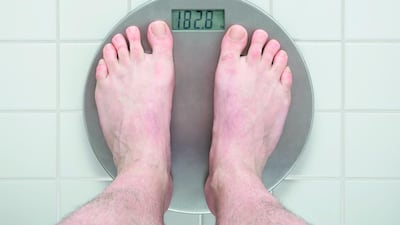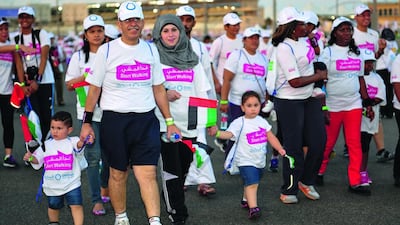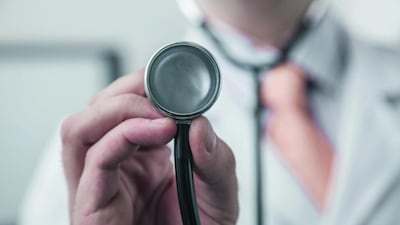Data gleaned from a nationwide diabetes screening programme of more than 12,000 people will help health authorities plan future services and improve public education on the condition.
Recently released results from a 100-day joint project between the Ministry of Health and Prevention (MoHP), show health authorities and the private sector diagnosed more than 1,000 people with either diabetes or pre-diabetes.
Medics were screening for glycated haemoglobin to indicate how much sugar there had been in the patient's blood in the months before the test.
Artificial intelligence will now use the data to predict the consequences of the disease and administer early preventive treatment to those with pre-diabetes to limit their dependence on long-term medication.
head of non-communicable diseases at the MoHP
Of the 12,877 people screened, 8.9 per cent, or more than 1,100, were found to have pre-diabetes.
Merck, the pharmaceutical company that managed the screening programme, expected the number of people with pre-diabetes to decrease after six-month medical follow-ups, once people were given support to manage the condition.
The serious health condition results from elevated blood sugar levels that are not high enough to lead to full-blown Type 2 diabetes, which can be avoided with healthy lifestyle changes.
Ahmed Fadl, general manager at Merck Gulf, which teamed up with health authorities to conduct screenings, said the campaign was much-needed in a nation with climbing rates of Type 2 diabetes.
“This is a disease that's very common in the region, especially here in the UAE,” he said.
“The problem of diabetes doesn't stand only on the disease itself, but the complications that develop in patients for years.
“The importance of this programme is to bring awareness and bridge the gap between disease diagnosis and treatment.
"It is a comprehensive project, from screening to diagnosis to treatment and follow-ups with patients, with lifestyle management treatment options and consultations.
“Around 70 per cent of pre-diabetic patients don't know they have the condition.
“This is where you need to not only make them aware, but also take actions and start diagnosing themselves.”
Nationwide campaign
The campaign, which began in October, was aimed at expanding comprehensive services across all parts of the country, providing support and information on how to manage diabetes through digital questionnaires.
Screening was completed for those at high risk, based on family history, body mass index, weight and lifestyle.
Medical consultations were then provided to treat and control pre-diabetes by linking the examination to the course of treatment, with medics following up with patients after three and then six months. Remote counselling was also provided.
By understanding the prevalence of pre-diabetes in the community, it is hoped the screening programme can help reduce the number of people going on to develop Type 2 diabetes, which often requires lifelong medical care.
National agenda
A dedicated hotline (800-3422 328) was established to support the project to provide follow-ups and answer public queries.
"The success achieved by conducting more than 12,000 tests for the early detection of diabetes nationwide within 100 days represents a quantum leap towards achieving our goals in reducing the prevalence of the disease,” said Dr Salem Al Darmaki, adviser to the Minister of Health and Prevention.
The numbers diagnosed during the 100-day campaign reflected previous population totals, too.
According to the International Diabetes Federation, in 2021 about 12.3 per cent of the UAE's adult population was diagnosed with diabetes, almost a million people.
It is hoped a wider campaign can be extended in the near future.
“The next step is to expand the roll-out even further next year, perhaps with an even larger programme,” said Mr Fadl.
“We are partnering with the Ministry of Health to bring artificial intelligence to predict high-risk patients through patient profiles.
“These are either stored digitally via Emirates ID or in the hospitals, so they are all connected to the Ministry of Health database.
“It is here where AI can identify those high-risk patients to direct them towards consultations and a change in their lifestyle.”
The MoHP aims to enhance preventive aspects of care to reduce the rate of lifestyle-related issues such as heart disease, cancer and diabetes.
It also aims to bolster health systems in preparation for future community demands on services.
“By encouraging a healthy lifestyle, in addition to focusing on the importance of early detection of diseases and risk factors, we can prevent chronic diseases before they occur,” said Dr Buthaina Bin Belaila, head of non-communicable diseases at the MoHP.
Weight loss – an important factor in reducing diabetes risk – is being tackled at Ras Al Khaimah Hospital where an annual campaign to encourage a healthier lifestyle received record registrations last month.
The scheme, which runs until March 4, offers cash prizes of Dh300 per kilogram for those losing the most weight. More than 18,000 people have signed up.
Meanwhile, Abu Dhabi Stem Cells Centre has joined forces with Kyoto University's Centre for iPS Cell Research and Application and Japanese biotech firm Rege Nephro to develop innovative new diabetes treatments.
Under the research, skin and blood cells are extracted and reprogrammed to replicate tissue cells damaged by diabetes.
The cell therapy promises new treatment options for both Type 1 and 2 diabetes.
"With the Department of Health – Abu Dhabi support in innovation and research, we believe this partnership will pave the way for transformative healthcare solutions in our region and beyond,” said Dr Yendry Ventura, chief executive at the Stem Cells Centre and adjunct professor at UAE University.







